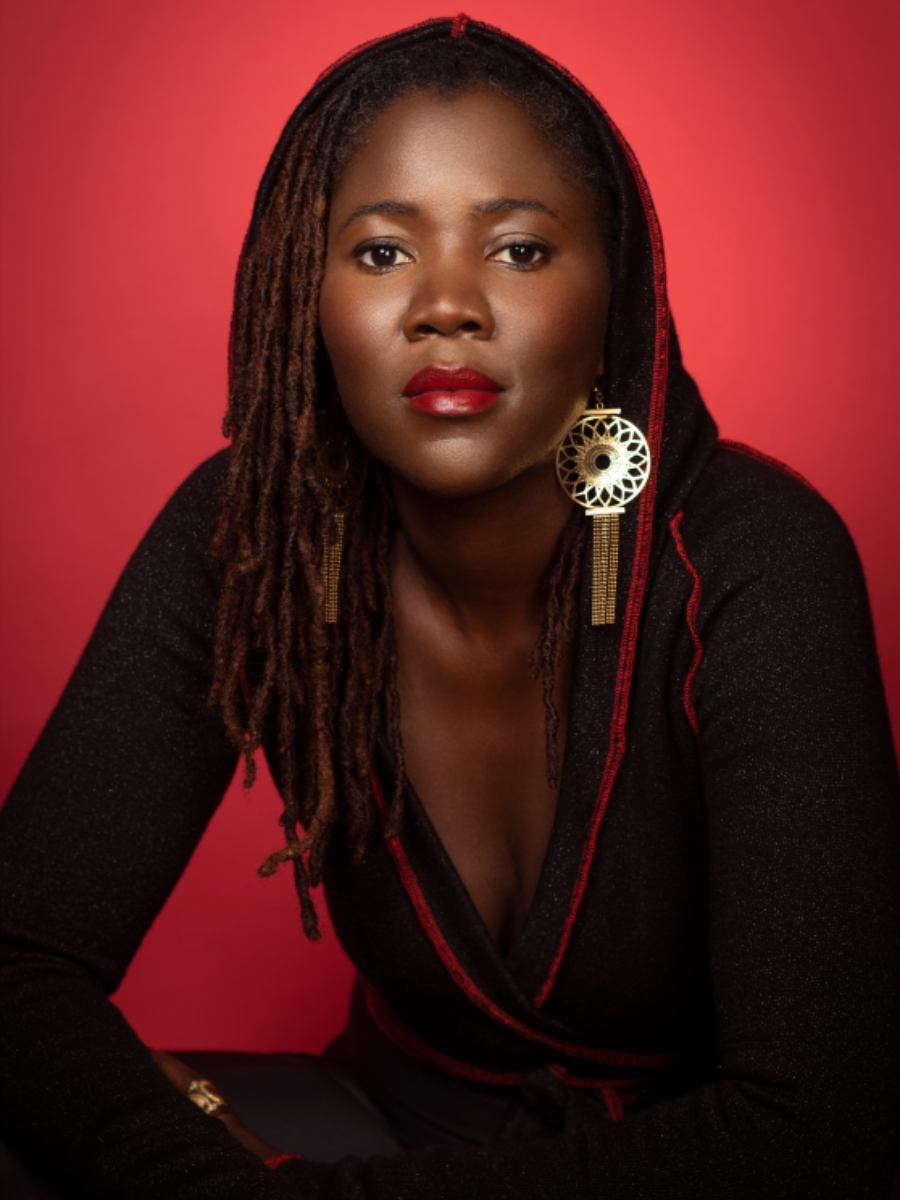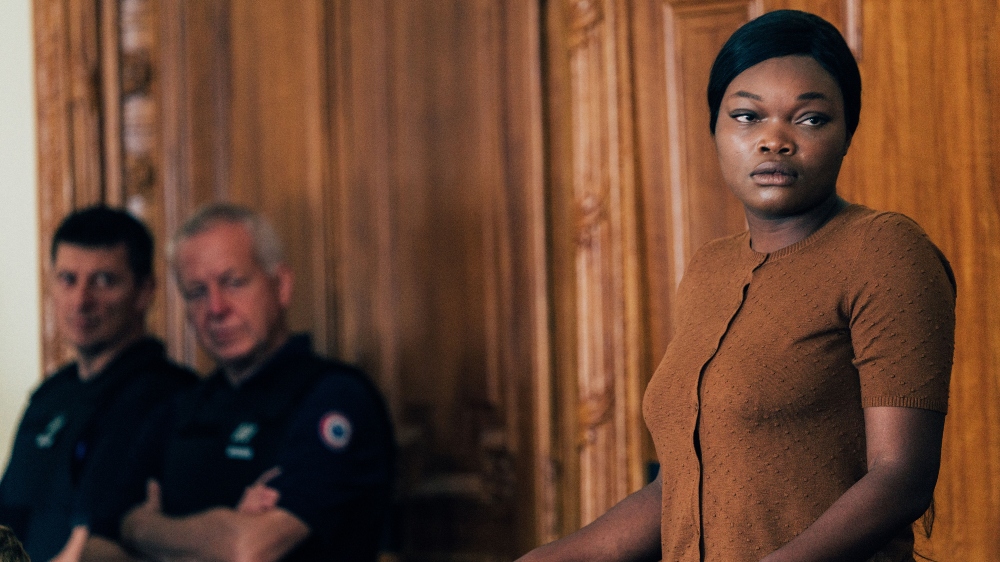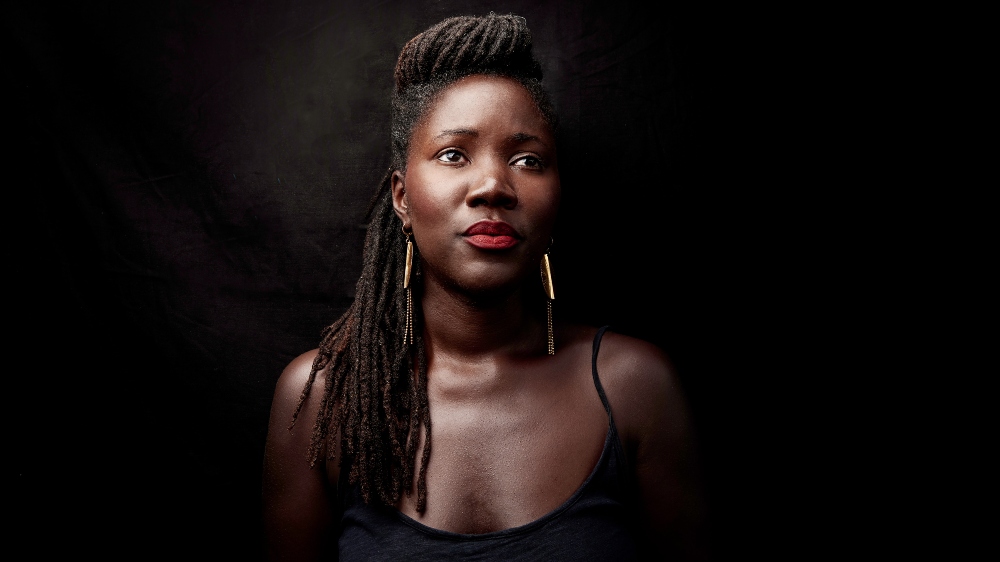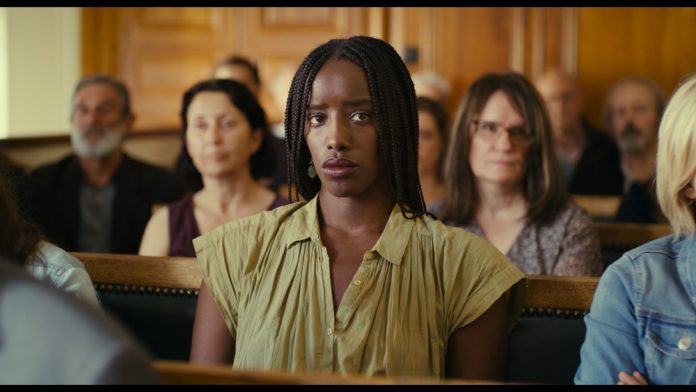In 2016, a documentary filmmaker named Alice Diop dropped in on a trial in France, and the experience no doubt altered the trajectory of her career.
Diop watched as a young woman stood in court, accused of leaving her 15-month-old child on a beach, fully knowing that waves would soon wash over and drown her baby. That woman never denied guilt; the trial was more about understanding why she committed the crime. So fraught and personal was Diop’s reaction to the case that after directing such documentaries as La Tour du monde (2005), La mort de Danton (2011), Vers la tendresse (2016), and Nous (2020), she chose to co-write and direct her first feature film, Saint Omer.
The acclaimed drama, which is now playing in theaters and serves as France’s official Oscar entry in the Best International Film category, where it has been shortlisted by the Academy, presents a fictionalized account of the trial. Kayije Kagame stars as Rama, an avatar of sorts for Diop. Rama is a pregnant novelist and professor who attends the trial of Laurence Coly (Guslagie Malanda), a Senegalese woman accused of letting her daughter die. Racism, class issues, patriarchy, maternal instinct, and more all come into play as the drama unfolds over two hours.
Above the Line recently spoke with Diop — via Zoom and with the help of an interpreter — about why she felt compelled to make Saint Omer, what it means to her to be the first Black woman to direct a French Oscar submission, and whether she plans to return to documentaries, focus on features, or do both.

Above the Line: You have spent most of your career in the documentary world. Did you always want to branch out into features, or did this particular story demand that it be done as a feature — and so you followed that path?
Alice Diop: I agree with you. This particular story required me to treat it from a fictional point of view. To bring some precision. I believe making it fiction allowed me the freedom to push my purpose much further, which could not have been possible if it had been a documentary. It wouldn’t have been possible anyway since the trial had already happened. For example, creating the fictional character of Rama allowed me to bring about the very deep question that interests me the most in that story. In other words, the maternity question — the link between mother and child.
ATL: Documentaries and features are very different storytelling forms. How did you prepare for writing and shooting this movie? Did you do a deep dive into legal dramas and other courtroom movies, or did you just write the script as it naturally came to you?
Diop: It was not at all different from what I do for documentaries because, for me, each film is its own prototype, and for each film, I end up creating a new language. For each film, we have different questions, which I get to dig deeper into.

ATL: Most courtroom-set movies are about determining guilt. Did he or she commit the crime? Your movie is more about why, and trying to understand the effects on both Laurence and Rama. When did you realize that was your story, rather than the question of innocence or guilt?
Diop: For the very reason you bring up. For me, this film is not a court drama. You’re correct. I am not interested in the question of whether she’s guilty or not. There is no mystery or suspense since from the beginning, we acknowledge that she is guilty. So, it could not be built with the usual suspense of a criminal inquiry. What fascinated me, when I witnessed the trial for the film, [was] the incredible complexity or capacity of this person, this woman. The complexity of this woman was telling me a lot of things important to me about immigration, exile, maternity, and French society. Also, the invisibility of immigrants and Black women. This is how I built my story and direction around all these different questions about this woman, and put it on stage.
ATL: You’ve got two actresses who do remarkable work here. What did you see in Kagame and Malanda that made them right for their respective roles?
Diop: I chose them because I felt within them the exact emotion and makeup that I needed for the characters. I did not want them to act. I wanted them to be those characters, so they would have the intensity that I was looking for. To be present in the moment, with spontaneity and intensity, would not leave any room for performing. The implication is that I had to seek actresses who were, within their fabric, very close to the actual characters I was trying to create. Which doesn’t mean that my actor Guslagie is a criminal, of course. I felt that within the emotional makeup, the possible trauma — that I would not talk about here — she had the capacity to understand and to leave something very close to what my character needed to express.
ATL: Rama is somewhat representative of you. How careful did you have to be in working with Kagame so that she didn’t feel as if she was playing you and that she had the freedom to give her own performance?
Diop: Well, she’s not me at all. She’s a fictional character. It is because of that, that I was able to use the character to highlight the subject matter which interested me in that trial. I was not pregnant when I went to the trial. My mother had already passed. Of course, there are things that I put in this character that I lived witnessing the trial, but my personal story — my intimate story — is very different from Rama’s. In this actress — Kayije — I was looking for the emotion and the makeup that resonated with the character I had created for the script.

ATL: You made two bold decisions that I’d like to discuss. You could have made Laurence the protagonist and Rama a supporting character, but Rama is the main character. And you could have depicted more of the characters’ lives away from the courtroom, but you kept that to a minimum, and what’s there of Rama’s side is very restrained. Please take me through the thought process on both those decisions…
Diop: Every spectator can decide who is the main character of the film, but how I conceived of the writing… it was like there was a duality between the two, face to face, a confrontation between a woman who is forced to speak, the defendant, and a woman, Rama, who doesn’t speak but is listening intently to what is said, managed to highlight within herself a lot of shadows.
As a woman who is about to have a child, all the questions and the angst she’s dealing with that she doesn’t know how to formulate are somehow expressed or highlighted by the narrative of this woman, the defendant. It is as if, for Rama, it is a form of psychoanalysis she’s going through. Listening to that other mother is allowing her to process a lot of confusion and dark angst within herself.
If I had the idea to conceive these characters, to put them in this silent dialogue together, it is because this is very much what I felt myself in the experience of the trial. It informed me and brought up a lot of questions and trouble that I felt in the place of my rapport with maternity, motherhood, [and] my mother.
ATL: You’ve been talking about Saint Omer for months while promoting it, and I’ve read that digging so deep into it has weighed heavily on you. Do you internalize your documentaries as much as you did this film?
Diop: The unique thing about this film is that I’m extremely moved and deeply overwhelmed by the reactions I get from every spectator who gives me feedback [or] their impression of it. So many times, women open themselves to me and share extremely personal, intimate, details of their lives, which is the reason why I made the film. Of course, it emotionally weighed on me a lot. I feel I am merely a vessel receiving all these emotions and it is a part of what I have to do for these films.
At the same time, I have no doubt that this film doesn’t need me to exist because it is a film that can take all the many interpretations, all the different projections and feelings that each spectator is going to live through, [and] it’s going to be different for everybody, so it has a life of its own in that way. I do feel the responsibility to be this vessel and to have this dialogue with the audience, to receive their feedback and their emotions, probably all the way to the Oscars. I hope I can hold on all the way there.

ATL: And will you be ready after the Oscars to let the film go?
Diop: After that, I might be ready.
ATL: Having made your first feature film, what’s your takeaway? Do you want to do more, or do you want to go straight back to documentaries? Or perhaps you hope to go back and forth between documentaries and features?
Diop: I will have no problem going back and forth. It just depends on what is the necessity of the story [and] the project.
ATL: You mentioned the Oscars. How excited are you that Saint Omer is in that conversation, and that it’s finding both an audience and acclaim around the world?
Diop: It’s a great honor that my film was selected to represent my country, and there’s a responsibility in this. I feel the responsibility to do my best [and] try to go as far as possible. This would probably be the first time that a foreign Black woman director would be nominated. Of course, that is also a great responsibility that I feel. The opportunity that Neon and Super offered me, to have this bigger platform, to be able to bring this political message, and for the film to be seen — exposed to a much larger audience than it would have been otherwise — is very wonderful. What I hope for is that Saint Omer reboots and refreshes a lot of the old clichés [and] preconceived ideas that people have of Black women. For that, I hope it will be seen [by] the largest possible audience.
Saint Omer is now playing in theaters.



